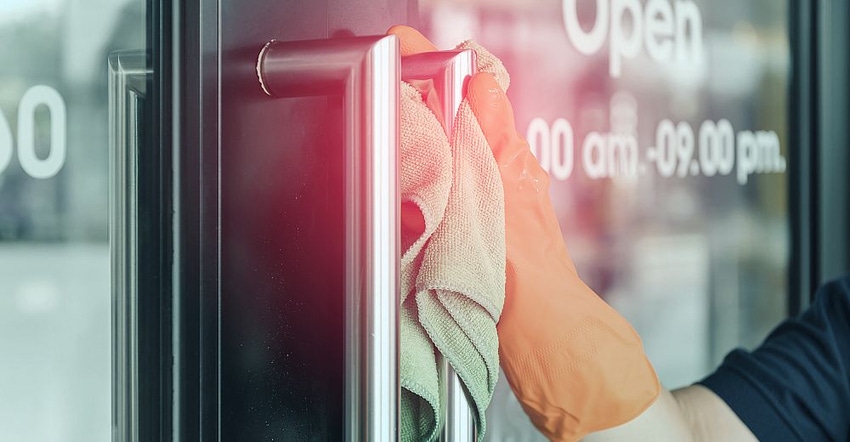Self-storage facilities have been viewed as relatively safe environments during the coronavirus crisis, but operators still need to address the cleanliness of shared surfaces to avoid health and business risk. Read about a nightmare scenario that could endanger your operation and how to avoid it.
July 31, 2020

Despite being several months into the coronavirus pandemic, there are still people who are unclear about (or ignore) critical facts about the virus and how it spreads. The primary mode of transmission is respiratory droplets from person-to-person contact (coughing, sneezing, talking or simply breathing). But this thing can also live on surfaces for anywhere from a few hours to a few days; so, it could spread if someone were to touch an infected surface and then his face.
Self-storage facilities have been viewed as relatively safe environments during the crisis because of low human traffic. Still, they have many shared, high-touch surfaces, and a focus on cleaning and sanitation is paramount. If your operation hasn’t embraced a disciplined practice, you could be putting human lives at risk, not to mention your business. Consider this nightmare scenario and how to avoid it.
The Scenario: Traced to You
Let’s say a person tests positive for COVID-19 and traces it back to your facility. While it might be difficult to conceive, many bars, restaurants and even some workplaces are dealing with this exact situation. It’s possible a customer could pick up the virus at your property, either from a member of your team or another prospect or tenant. What would happen if you were suddenly served with a lawsuit alleging your business was directly to blame for someone becoming ill (or worse) as a result of operational negligence?
There are many places at a self-storage facility where cross contamination can occur. Some are obvious, but you may not have considered some of these:
Keypads
Property and unit door handles
Moving carts and dollies
Elevator buttons, rails and walls
The restroom
The office counter, and anything on it
Office furniture
Product in your retail area
Credit card reader
Payment cards and cash
Self-serve tablets and kiosks
Items on your community board
Contact tracing is improving each day. It allows health officials to identify and monitor people who’ve possibly been infected. If the virus gets traced back to your location, or a customer alleges he got it from you, even if it isn’t true, what would that mean for your business bottom line and reputation?
Solutions
There are many steps you can take to minimize your risk. First, know and follow the health and safety guidelines issued by the Centers for Disease Control and Prevention and the Occupational Safety and Health Administration. Educate and train all team members on the most recent risk factors. Of course, no staff member should ever come to work if he feels sick; but as COVID-19 is largely transmitted by people who are still asymptomatic, more precautions are required.
Facility safety and cleanliness should be a top priority. Here are some of the things you should be doing to protect employees and customers:
Limit the number of people in the office at any one time, and insist that anyone entering must wear a mask.
Enforce social distancing in the office by marking places for people to stand.
Install a plexiglass barrier at the counter.
Provide masks and other personal protective equipment for staff and enforce their use.
Provide hand-sanitizer and disinfectant wipes throughout the property.
Disinfect the office after each customer leaves, wiping down the counter, the door handle and anything else he might have touched.
Clean the restroom after each use.
Create a frequent schedule for disinfecting other high-touch areas.
As with many things in life, prevention is the best remedy. More and more self-storage operators are exploring contact-free rentals. By leveraging automated tools and services, you can limit the amount of interaction and surface-handling that occurs on site. Items in use include online or phone-based reservation and billpay systems, app-based facility and unit access, electronic locks, remote video surveillance, online and phone-based customer support, and others.
Remember, even though you may be using technology, you still must sanitize high-touch surfaces! A kiosk is great for avoiding face-to-face interaction, but to avoid the spread of infection, it must be cleaned between each use. It’s also a good idea to set up cleaning stations around your site.
There have always been many risks to operating a self-storage facility. There are even more now in this time of pandemic. Know what they are and take the steps to avoid them. Sanitation and contact-free operation are key components in the new equation for success.
Information for this article was provided by ISS Staff as well as J. Ashley Oblinger, an associate attorney in the Atlanta law firm of Weissmann Zucker Euster Morochnik & Garber, P.C.
You May Also Like





